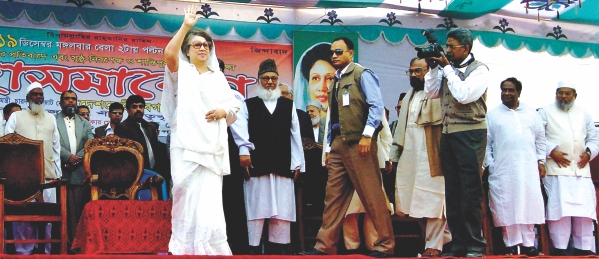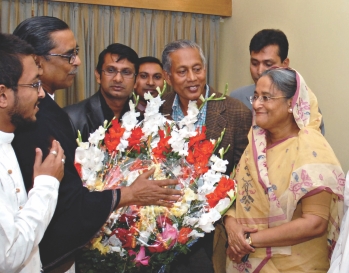| Home - Back Issues - The Team - Contact Us |
 |
| Volume 10 |Issue 29 | July 29, 2011 | |
|
|
Politics
Polarising Politics Moha The Bangladesh Nationalist Party (BNP) has embarked on a positive course of action. It has, for the time being, decided to shun hartal because of its violent nature in our settings. The party chairperson Khaleda Zia has hinted at greater people's movement against the government. It has been staging protests and demonstrations in various parts of the country against the government policies and actions. Last week went by peacefully except for a few stray incidents. Riding high on the Union parishad poll results, the BNP appears to have regained the confidence after being drubbed in the last national polls. It is a positive sign for the party in that its leaders are now returning to political activities. The BNP favourites won chairmanship in nearly half of the unions in recent polls. Most importantly, the party has decided to look for prospective allies in its bid to launch a strong anti government movement. It is trying to reach out to smaller parties to strengthen the alliance. Meeting with Oli Ahmed of Liberal Democratic Party (LDP) and Kader Siddiqui of Krishak-Janata Sromik League (KJSL) has been termed as a significant progress in its endeavour. But response from these two was hardly encouraging. Oli Ahmed, a former BNP man, might have some inclination to join hands but Kader Siddiqui may not comply with the BNP request so easily. He is known for his own brand of politics. He has made it clear that his party will decide about collective movement only after his talks with the Awami League President. He has advised Khaleda Zia to refrain from observing her birthday on August 15 and also revise the party's stand on alliance with religion based parties, although he has agreed on the BNPs position on scrapping of caretaker government system.
Therefore, it is rather immature to predict about the fate of the BNP and the KJSL dialogue. Interestingly, following BNP's move, some Awami League (AL) members, including a state minister, met Kader Siddiqui the very next day. The AL termed the meeting as a courtesy call and meant to extend the PM's invitation for a talk. Bikalpadhara Bangladesh Chief Dr AQM Badrudozza Chowdhury has been courteous but has not promised a long-term partnership with the BNP. HM Ershad has made it clear that teaming up with the BNP is not possible. ASM Abdur Rob of the JSD has a different view of the whole exercise. To him, the big parties are only busy to counter each other. There is nothing constructive in their programme. It may not be easy for the BNP to find new allies. Political dialogues and alliances are nothing new and there is nothing bad about it. Rather it is an indicator to healthy political practice. People would like to see a departure from the tradition of our destructive politics. In fact, peaceful political discourses are now a matter of the past. If the BNP and other parties have found rationale in peaceful means it should be a welcome break from the violence ridden politics. The people will gain from the healthy exercise. The greatest beneficiary will be the institutions that is worst affected by non-democratic practices. Apart from the caretaker issue, the opposition has many issues in hand to take up against the government. The law and order situation has taken a worse turn; the traffic system has become absolutely intolerable, most importantly, galloping price of essentials has made people's lives totally miserable. All the issues taken together should put the opposition in an advantageous situation. Party insiders, however, claim that we are gradually inching towards something like an Arab uprising that started in Tunisia. They believe that a greater alliance will be forged with like minded parties in a short while. At an opportune moment, there will be a massive congregation of people in Dhaka demanding ouster of the government. They believe that the government has opened up too many fronts. There has been a sense of abruptness in all its actions. From scrapping of caretaker government system, to trials of war criminals, to naming and renaming of institutions, to transit issue etc. In just two and half years it took up too many things on its platter, many of which found precedence over more important issues. When the BNP and its allies called for the 48-hour hartal early this month and the subsequent events sent a chill down the spine of this nation. All apprehended a disquieting future of our politics. The situation was indeed one of grave concern. In course of the confrontation, the government turned more hostile. Almost all senior leaders of the Awami League embarked on blasting the opposition in the harshest terms possible. Instead of talking about reconciliation, it did just the opposite. But good sense has prevailed on the leaders of the opposition and in a magical turn as the party has decided to go for a peaceful means to make its point. Hence, the token hunger strike, peaceful protests and the dialogues with other parties. All said and done, we want to see a sea change in our politics. It has been 40 years since independence but our political institutions have only gone from bad to worse. The constitutional history of Bangladesh is replete with instances of immature handling. Political parties have almost forgotten democratic practices in their own rank and files. Parliamentary democracy is only a mockery. Not only has the opposition kept away from the sessions, the house has fallen short of quorum many a time due to absence of government lawmakers. With politics going bankrupt, other sectors have been badly affected. Corruption has crept in all spheres including educational institutions. We need a change in our thoughts and in our actions. The first step towards this change will be to 'believe in peace and civility'. The writer is Assistant Editor, The Daily Star.
Copyright (R) thedailystar.net 2011 |

